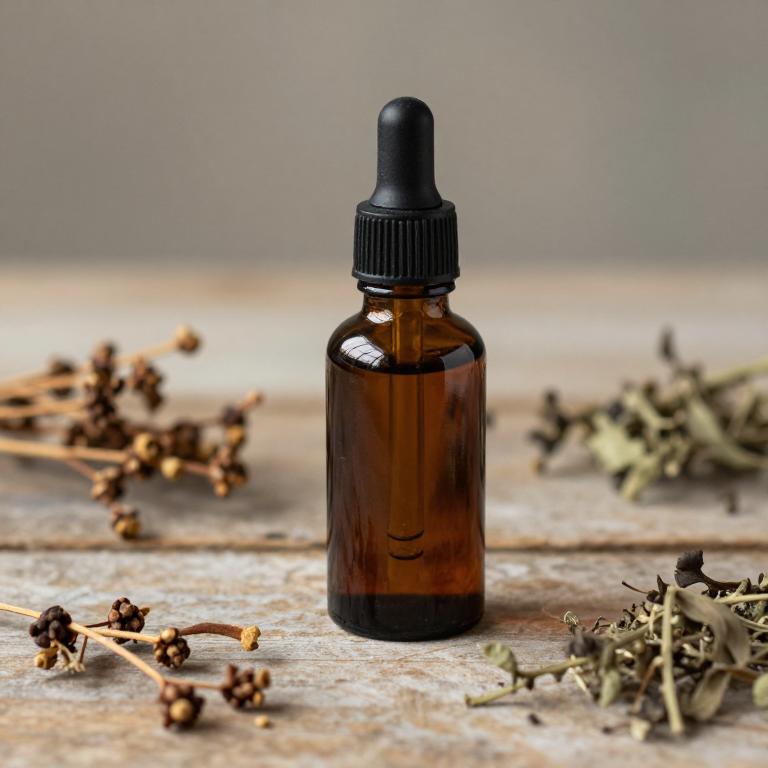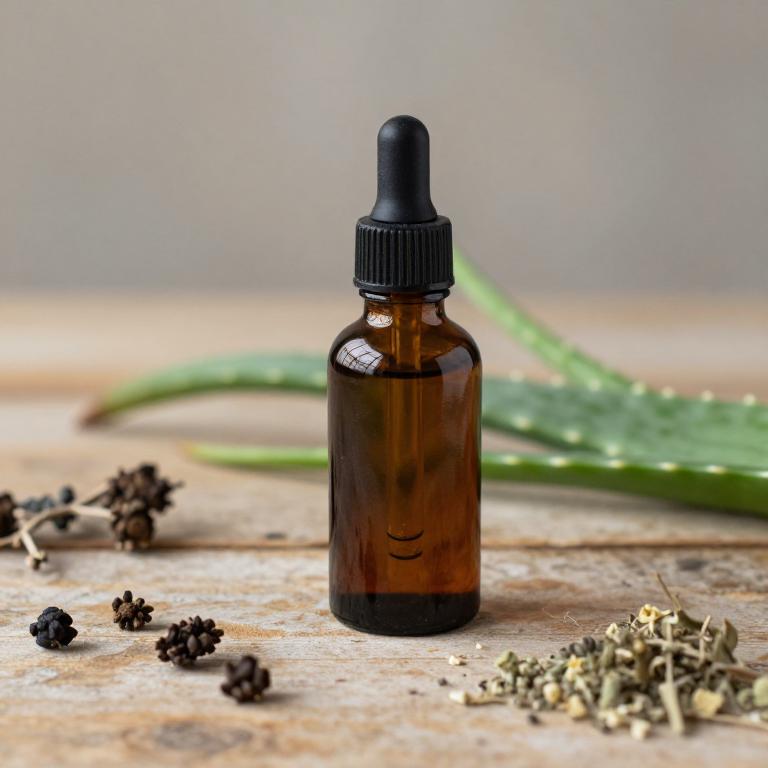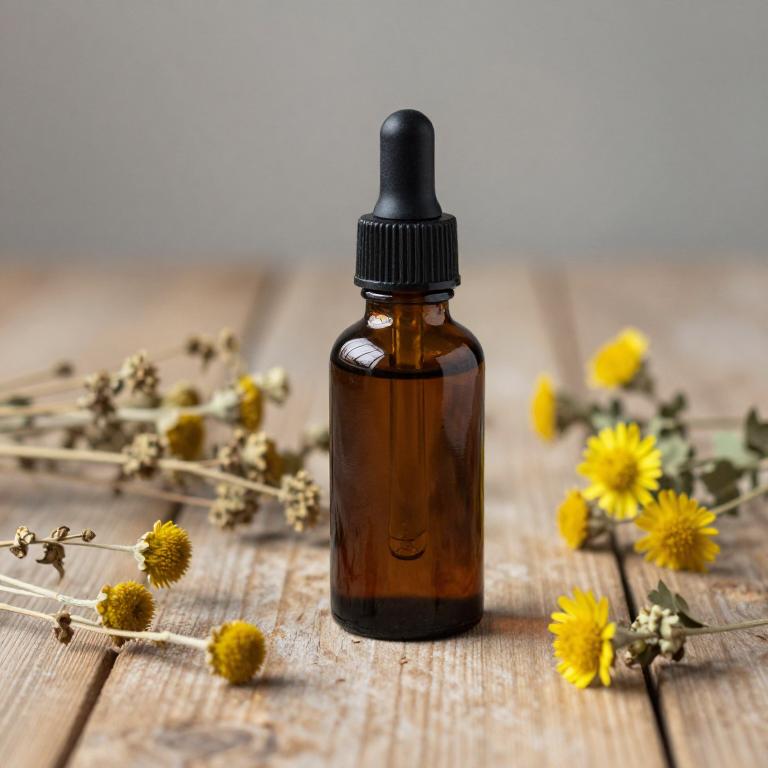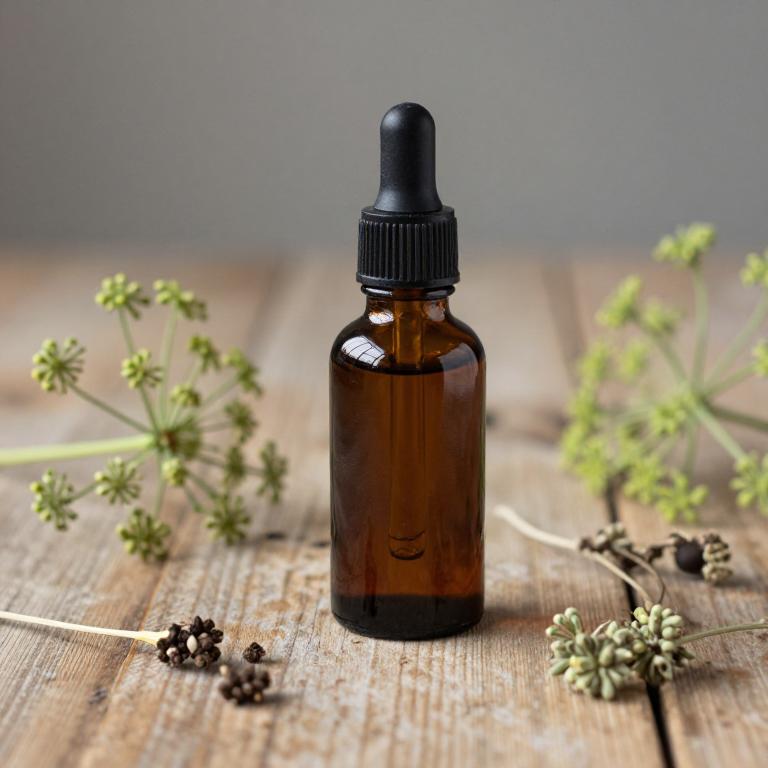10 Best Herbal Tinctures For Swollen Gums

Herbal tinctures have gained popularity as natural remedies for addressing swollen gums, often used in conjunction with standard dental care.
These tinctures typically contain plant-based extracts such as echinacea, calendula, and sage, which are known for their anti-inflammatory and antimicrobial properties. When applied topically or used as a mouth rinse, these herbal tinctures can help reduce gum inflammation and prevent infection. However, it is important to consult a dentist or healthcare provider before using them, especially if symptoms persist or worsen.
While herbal tinctures may offer relief for mild gum irritation, they should not replace professional dental treatment for more severe conditions.
Table of Contents
- 1. Salvia (Salvia officinalis)
- 2. Marigold (Calendula officinalis)
- 3. Stinging nettle (Urtica dioica)
- 4. St. john's wort (Hypericum perforatum)
- 5. Echinacea (Echinacea purpurea)
- 6. Bloodroot (Sanguinaria canadensis)
- 7. Aloe vera (Aloe barbadensis)
- 8. German chamomile (Chamomilla recutita)
- 9. Anise (Pimpinella anisum)
- 10. Yarrow (Achillea millefolium)
1. Salvia (Salvia officinalis)

Salvia officinalis, commonly known as sage, is a herb that has been traditionally used for its antimicrobial and anti-inflammatory properties.
Herbal tinctures made from salvia officinalis can be beneficial for swollen gums due to their ability to reduce inflammation and combat oral bacteria. These tinctures are typically prepared by soaking the dried leaves in alcohol, allowing the active compounds to be extracted. When used as a mouth rinse or applied directly to the gums, they may help alleviate gum irritation and promote healing.
However, it is important to consult with a healthcare professional before using any herbal tincture, especially if you have existing health conditions or are taking other medications.
2. Marigold (Calendula officinalis)

Calendula officinalis herbal tinctures are traditionally used for their anti-inflammatory and antimicrobial properties, making them a natural remedy for swollen gums.
These tinctures contain bioactive compounds such as flavonoids and triterpenes, which help reduce gum inflammation and promote healing. When applied topically, calendula tinctures can soothe irritated gum tissues and alleviate discomfort associated with gingivitis or periodontal disease. They are often preferred for their mild nature, as they are less likely to cause irritation compared to some synthetic treatments.
However, it is important to consult with a healthcare professional before using calendula tinctures, especially if you have known allergies or are taking other medications.
3. Stinging nettle (Urtica dioica)

Urtica dioica, commonly known as stinging nettle, has been traditionally used in herbal medicine for its anti-inflammatory and astringent properties.
When prepared as a tincture, it can be applied topically to swollen gums to help reduce inflammation and promote healing. The active compounds in stinging nettle, such as flavonoids and minerals like silica, contribute to its ability to soothe irritated tissues. However, it is important to dilute the tincture properly before applying it to the gums to avoid irritation.
While some herbalists recommend it for gum health, it should be used with caution and under the guidance of a qualified practitioner.
4. St. john's wort (Hypericum perforatum)

Hypericum perforatum, commonly known as St. John's Wort, is a herbal remedy that has been traditionally used for its anti-inflammatory and antimicrobial properties.
When prepared as a tincture, it may offer potential relief for individuals suffering from swollen gums due to its ability to reduce inflammation and combat bacterial infections. The active compounds in hypericum perforatum, such as hypericin and hyperforin, are believed to contribute to its healing effects on oral tissues. However, it is important to consult with a healthcare professional before using this tincture, as it may interact with certain medications.
While some anecdotal evidence supports its use for gum health, more scientific research is needed to fully understand its efficacy and safety in treating swollen gums.
5. Echinacea (Echinacea purpurea)

Echinacea purpurea herbal tinctures are commonly used for their potential anti-inflammatory and antimicrobial properties, which may help reduce swelling and irritation in gums.
These tinctures are typically made by soaking the dried roots and flowers of the echinacea plant in alcohol, creating a concentrated herbal extract. Some studies suggest that echinacea can support the immune system, potentially aiding in the body's response to gum infections. However, it is important to consult with a healthcare provider before using echinacea tinctures, especially for individuals with chronic gum issues or those taking other medications.
While echinacea may offer some relief for swollen gums, it should not replace professional dental care or prescribed treatments.
6. Bloodroot (Sanguinaria canadensis)

Sanguinaria canadensis, commonly known as bloodroot, is a traditional herbal remedy that has been used for its potential anti-inflammatory and antimicrobial properties.
When prepared as a tincture, it may help reduce swelling and irritation associated with gum inflammation. The active compounds in bloodroot, such as sanguinarine, are believed to possess antiseptic and astringent qualities that can support oral health. However, due to its potent nature, it should be used with caution and under the guidance of a qualified herbalist or healthcare provider.
While some practitioners recommend it for localized application to swollen gums, its safety and efficacy for long-term use require further scientific validation.
7. Aloe vera (Aloe barbadensis)

Aloe barbadensis herbal tinctures are derived from the gel-like substance of the Aloe vera plant, known for its soothing and anti-inflammatory properties.
These tinctures can be applied directly to swollen gums to help reduce inflammation and promote healing due to their high concentration of antioxidants and nutrients. The natural compounds in aloe vera, such as polysaccharides and enzymes, work to enhance tissue repair and combat bacterial growth, which can contribute to gum swelling. When used as a complementary therapy alongside proper dental hygiene, aloe tinctures may offer relief from mild gum irritation and inflammation.
However, it is important to consult with a healthcare professional before using any herbal remedy, especially if you have existing oral conditions or are taking other medications.
8. German chamomile (Chamomilla recutita)

Chamomilla recutita, commonly known as German chamomile, is a popular herbal remedy used in tincture form to alleviate symptoms of swollen gums.
The tincture contains active compounds such as flavonoids and essential oils, which have anti-inflammatory and antimicrobial properties that help reduce gum inflammation and prevent infection. When applied topically or used as a mouth rinse, chamomilla recutita tinctures can soothe irritation and promote healing in the oral cavity. Its mild and calming effects make it a safe option for many individuals seeking natural relief from gum issues.
However, it is important to consult with a healthcare professional before use, especially for those with allergies or existing medical conditions.
9. Anise (Pimpinella anisum)

Pimpinella anisum, commonly known as anise, has been traditionally used in herbal medicine for its anti-inflammatory and antimicrobial properties, making it a potential remedy for swollen gums.
When prepared as a tincture, anise can be applied topically or ingested in small doses to help reduce gum inflammation and combat bacterial infections. The essential oils in anise, such as anethol, contribute to its soothing effects on the oral cavity, promoting healing and relief from gum irritation. However, it is important to consult with a healthcare professional before using anise tinctures, especially if you have existing health conditions or are taking other medications.
While anise tinctures may offer natural support for gum health, they should not replace conventional dental treatments recommended by a dentist.
10. Yarrow (Achillea millefolium)

Achillea millefolium, commonly known as yarrow, has been traditionally used for its anti-inflammatory and astringent properties, making it a potential candidate for herbal tinctures aimed at reducing swelling in gums.
When prepared as a tincture, achillea millefolium can be applied topically or taken internally to help alleviate gum inflammation and promote healing. The active compounds in yarrow, such as flavonoids and essential oils, contribute to its ability to reduce inflammation and combat bacterial infections that often accompany gum issues. Herbal tinctures made from achillea millefolium may offer a natural alternative for those seeking to manage gum swelling without synthetic medications.
However, it is important to consult with a healthcare professional before using yarrow tinctures, especially for prolonged periods or in conjunction with other treatments.